Text
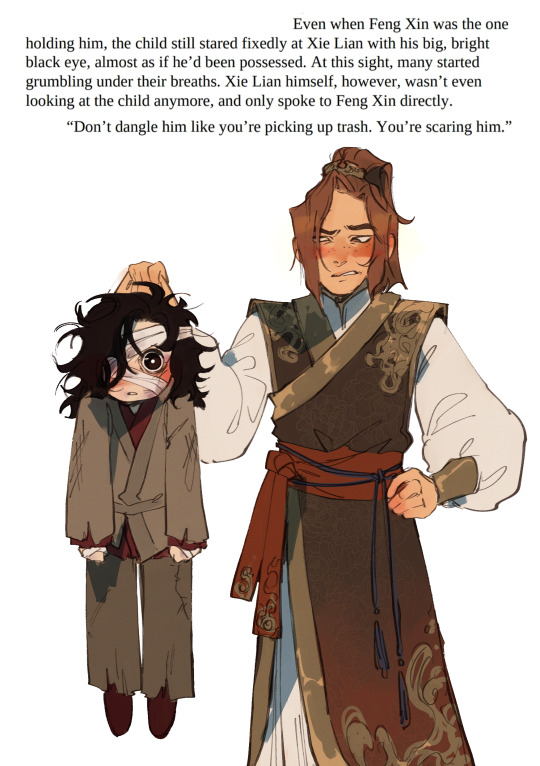
pls assume i'm thinking about this moment 24/7 all week every week
#This specific scene lives in my head rent free donzjdbdjd#Hong-er dead stare fixated on Xie Lian while Feng Xin holds him like a stray cat#Idbzjdbd I absolutely love it your rendition is perfect
7K notes
·
View notes
Text
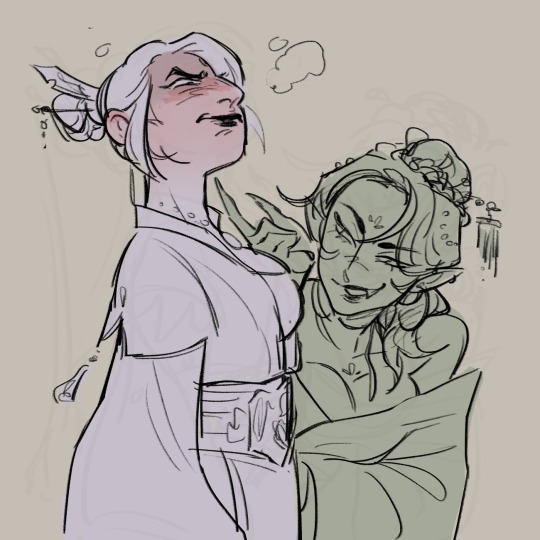
if your toxic yuri isnt toxicyuri-ing to your tastes, store bought works just fine
#Wake up babes new awesome Yuri ship just dropped#Indjjdd nah seriously I'm invested now#I need more of them and I'm sincerely serious when I say that#Also op the way you drew them and your art style are simply 👌✨#KZNJDJD NAH SERIOUSLY MY YURI INSPIRATION IS COMING BACK FULL SPEED I NEED THEM SO BAAAAD
272 notes
·
View notes
Text
I don't believe it's because of fandom heteronormativity in Luo Binghe’s case (though it could definitely be depending on the fanartist or the writer) but rather because of how western typically represents villain and hero coded characters in popular medias.
Villains tend to be pictured as tall, slender, with sharp features and a cold aura in popular western media. (Think Jafar in Aladdin, Loki in Thor, or even, on the less tall side, Azula from Avatar The Last Airbender) It is particularly true when it comes to school-related stories: the evil teacher who gives you bad grades and treats you with contempt… They often fit that description. (Think Severus Snape in Harry Potter, the book version specifically, not Alan Rickman) Not only that, but more often than not, they’re also associated with queerness (and feminity) in order to “other” them from the rest of the cast. (It happens often in Disney movies: Scar from the Lion King, Hades from Hercules…)
Which I might dare say fits very well with the western fandom’s depiction of Shen Qingqiu.
Meanwhile Heroes tend to be pictured as broader, with softer features but also more typically masculine traits. They’re often kind, a bit awkward, and sometimes they have one specific feature that other them, but usually only one. (Think Superman in the DC comics, Captain America or Thor in the MCU… On the less broad side, but same category: Aladdin from the Disney movie, Harry Potter, Aang from Avatar The Last Airbender).
Again, if you add to that some of the hyper-masculinity associated with stallion novel protagonists, you end up getting the western fandom’s depiction of Luo Binghe.
So yes, inevitably, when shipping a stereotyped hero with a stereotyped villain, as imagined by western media, there is some sort of heteronormativity going on. I might even dare suggest the western fandom leans even more into those aspects because a queer effeminate man being the first antagonist of a stallion novel fits awfully well with what they have seen from western media. There is some heteronormativity, but not because of internalized homophobia, rather because it’s about taking back the tropes and play with them to go against expectations. (You know what’s also very popular in the SVSSS western fandom? Bottom Luo Binghe. That’s not very hyper-masculine, is it?)
Another factor that made me believe it’s more about playing with popular western media tropes rather than fandom heteronormativity is how the rest of the SVSSS cast is pictured by the western fandom. They ALL fit some sorts of trope.
Luo Binghe’s subordinates all fit antagonists’ underlings’ tropes: Mobei-Jun is the broad brawn who usually stays cold and quiet, Shang Qinghua is the evil henchman (a trope often associated with animalistic features by the way… Often rodents… You know, like hamsters), Sha Hualing is supposedly the sexy seductress, but the western fandoms more often than not depict her as being “one of the boys” (both tropes often associated with female characters in a group of antagonists). Honestly, I could go on and on about the way Sha Hualing is represented depending on fandoms and cultures, but the gist of it that in the western fandom she is Harley Quinn.
Meanwhile Cang Qiong Mountain fits the tropes associated with allies of the protagonist: Yue Qingyuan is the leader (think Shiro in Voltron), Liu Qingge the lancer, Shang Qinghua the comic relief (lucky guy gets both sides), Qi Qingqi the “girl”, and Mu Qingfang the nerd (he is often depicted with glasses in the western fandom btw).
Meanwhile if you look at it all from an eastern fandom’s POV, most of the characters DO fit the harem genre as explained in SVSSS. The reason as to why the western fandom doesn’t follow that kind of logic is because we typically don’t have harem centered stories in popular media… Except in one very specific place: fandoms. Hence why when we tend to make analyses of SVSSS we tend to think from a fandom’s POV. But once you start looking at the broader picture, it’s clear that the western fandom simply reclaimed the tropes they were used to from popular media through SVSSS which is a book about subverting popular media tropes through fandom culture.
So basically, Tl;Dr : It is heteronormativity, but not because we typically represent tops as broader and bottoms as weaker, but rather because those are two opposite popular tropes (the queer villain and the hyper-masculine protagonist) which inevitably leads to some sort of deliberate heteronormativity people can play with and break the codes of.
Exposing SVSSS Fanon: 16/∞
LUO BINGHE HAS A "STEREOTYPICALLY MASCULINE" APPEARANCE
Rating: FANON - CONFLICTING
In fanworks, Luo Binghe is often portrayed as particularly muscular and buff, broad-shouldered, often with tanned skin and sharply-defined features-- all traits that are considered to be stereotypically masculine in the west.
All of this directly contradicts his canonical description.
Necessary disclaimer: I'm not talking against depicting Luo Binghe with a naturally darker skin tone. While that still contradicts the canonical description, I can understand going against colorism (something very rampant in east asian beauty standards!) in fanworks. This sort of discussion is particularly toward those who portray him as fair-skinned on Qing Jing Peak, darker skinned after the abyss, hence "tanned." While this sort of thing might have issues of its own, that's also not the topic of this post, and as a light-skinned Asian person, I don't feel particularly qualified to talk about it.
In truth, deep down, Bing-ge’s fair and clean pretty-boy type didn’t really suit the tastes of “Great Master” Airplane Shooting Towards the Sky.... The art of growing stallions was grounded in science, and the research was clear: women preferred men who looked cultured, pretty, and even a bit soft and feminine.
(7 Seas, Ch. 26)
The buff and bulky Luo Binghe often seen in fanworks is not what I would consider to be cultured, pretty, soft, and feminine.
Luo Binghe is described this way just before the conference:
A seventeen-year-old youth, slim and tall and graceful, dressed in white robes, lips turned upward in the hint of a smile, gazed at him with a pair of shining eyes.
(7 Seas, Ch. 4)
And again after his return:
The other party was a little taller than [Shen Qingqiu], slender and willowy, dressed in clothes as black as ink that exposed only a fair neck.
(7 Seas, Ch. 7)
And a description of his hands later on:
That hand was slender and unadorned. It didn’t look like the hand of a young lord of the demon race who had already taken countless lives, but rather one whose master had been born to pluck strings, his hand to burn incense and bathe in snow.
(7 Seas, Ch. 14)
Consistantly, Luo Binghe is depicted this way-- slender and refined, with fair skin and a softness to his appearance that contradicts his actions.
As for where the fan depiction of buff, tanned, "hyper-masculine" Luo Binghe may have originated?
I'm not certain where the first such depiction came from, but as for the logic behind it, such phenomena could be explained as thinking of Luo Binghe, the stallion protagonist, as having an "ideal masculine" appearance.
For western audiences and beauty standards, this would certainly be that same sort of muscular, tall, with tanned skin and defined features. Naturally, when first thinking of what a "stereotype of an ideal man" would look like, these traits would come to mind.
It is a bit different in eastern standards. While muscular appearances can still be favored, lean muscle is vastly, vastly preferred over bulky muscle, and fair skin, which represents elegance and status (as those with fair skin tones are perceived as those who are wealthy, and do not need to work outdoors) is preferred over tanned skin. This is, of course, a generalization-- but as a representation of ideal masculinity, Luo Binghe's appearance would also be a generalization.
Particularly, Luo Binghe's figure and appearance is described not as those favored by men for themselves, but as those favored aesthetically by women. Therefore, that gentle, refined appearance is a must.
So often i've seen that Luo Binghe's bulk and muscles are shown as central traits of his physical appearance, despite the fact that this directly contradicts his actual depiction in the novel. Thus, it is inaccurate to depict him this way.
Luo Binghe's canonical body type and build is tall, slender and willowy, and his features are soft and a bit effeminate. The best example I could give for reference would be to base his body type off of a pretty-boy type idol.
Of course, fanartists are perfectly free to continue drawing him however they please, but it should not be assumed that a Luo Binghe with bulky musculature, tanned skin, and sharp features is a canon-compliant depiction.
Luo Binghe is a pretty boy.
#I hope I was clear enough with what I wanted to say ^^'#As a fanartist in this fandom this is personally what I've noticed about that matter and what i thought about when making my own designs#btw we all grew up with different media codes so for example I draw LBH more like a typical shounen protagonist#it all depends on what people have been used to growing up I believe#meta#analysis#svsss
763 notes
·
View notes
Text
wuxia, xianxia, and cultivation differences meta
translations: wuxia 武俠, xianxia 仙俠, and cultivation 修真/修仙 (xīuzhēn/xīuxiān)
think i've seen posts on this eons ago, and i'm pretty sure there are tons of these online, but since this has been written up already let's just have another one.
wuxia 武俠
wuxia and xianxia sound similar, but basically for wuxia it is about the pugilistic world (江湖 jiānghú). It is relatively more down-to-earth, and people practice martial arts ("kungfu") in their current life -- they do not do it to become xians (仙) and gods (神) however.
Like Thousand Autumns and Faraway Wanderers/Word of Honor, it has more historical background and ties to the current court and kingdoms, because people are living in the moment and concern themselves with worldly issues.
Martial arts may seem unrealistic, but in view of chinese fantasy it would be considered "real". It consists of fighting moves and internal energy, which they call qi or nèigōng (內功), and at times you see people flying around, climbing hills and jumping across rooftops which is qīnggōng (輕功).
xianxia 仙俠
A level up would be xianxia, where characters in the story cultivate to become xians (and gods, like in the heaven official's blessing). They don't really care about earthly issues here now, because their ambitions lie beyond the current world, and cultivation, getting stronger, and an immortal life are majorly all their goals.
You may not always see them working towards that purpose, such as in mdzs they are considered a lower-xianxia society (低魔), meaning people don't go through all the steps of cultivation and only stay at the stage before the "golden core" stage.
In xianxia, characters still learn basic fighting moves aka. martial arts, but to direct the internal energy they use línglì (灵力), zhēnqì (真气), and fǎlì (法力), all xianxia terms you commonly see. "neigong" is practically nonexistent in this genre. That's why people building up their "neigong" instead of "lingli" are likely never going to be able to cultivate.
cultivation 修真/修仙
A subgenre in the xianxia category would be cultivation. Characters actively go through the stages of cultivation, and likely for the MC, because they are the main character, they successfully become a xian and exit the world at the end of the novel.
There are many stages of cultivation, usually defined at the beginning of the novel in the synopsis, and a typical example of the different levels would be this:
练气,筑基,金丹,元婴,化神,炼虚,合体,大乘,渡劫
And with a cursory search, an English translation would be something like this, albeit not with all the cultivation ranks identified.
Qi condensation (练气), Foundation establishment (筑基), Core Formation (金丹), Nascent Soul (元婴), and the names after that vary too greatly with translation and fandom so I'll jump straight to Immortal Ascension
extra info: getting into the philosophy of it all
It'd be interesting to note that the word "xiá" (俠) permeates all these genres. This is something akin to the concept of "hero", but not at all also, and I'd love to speak more on this but this post has already gone way longer than I hoped it would be, so perhaps another day.
Regardless, it is interesting to note that wuxia has a greater emphasis on "xia" than xianxia. (some joke that cultivation doesn't have the word "xia" in it, and much of that is because characters have foregone heroism and focused on gaining powers and working towards ascension instead). As a result, wuxia is more confucianism-oriented, though not without its taoism and buddhism influences.
xianxia, on the other hand, is mainly derived from "dào" (道), from taoism, which is another lengthy concept if I ever get to it.
And some may have heard of the "farming" genre, 种田 (zhòngtián). This has to do with golden fingers (mary sues) in imperialistic china, earning a wealth of money, and all that. It has nothing to do with cultivation, alike they sound in english.
that's it for now, hmu if you wish to ask/discuss!
(and apologies for the pinyin translations, hope it's understandable still! formally writing pinyin they are supposed to be two separate words not one.)
3K notes
·
View notes
Text
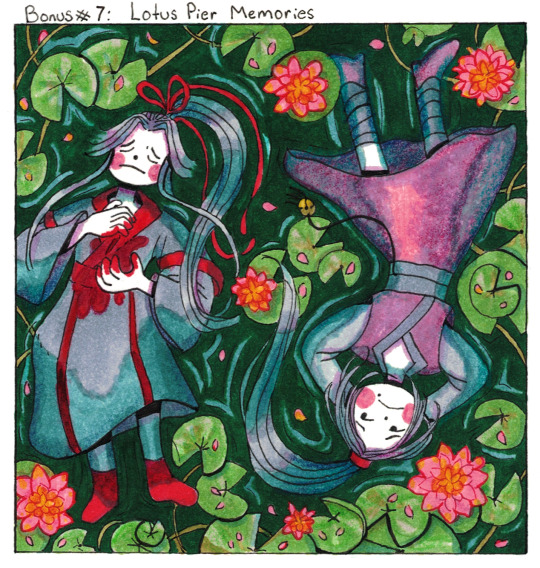
Bonus 7: Time moves sideways
[First] Prev <–-> Next
#I'm legitimately obsessed with this#Your struggle was worth it and I so understand it but the water looks amazing#It really feels like his body is floating in a lake it's simply ✨#But also the whole imagery?#Blooming lotuses while Wei Wuxian's wound bleeds? His other self looking at him passing him by? So many memories... Lost to time and regret#EVERY DAY I WAKE AND THEN LOTUS PIER'S LAKE IS HERE *sobs loudly*#But seriously though amazing art it made me cry
1K notes
·
View notes
Text
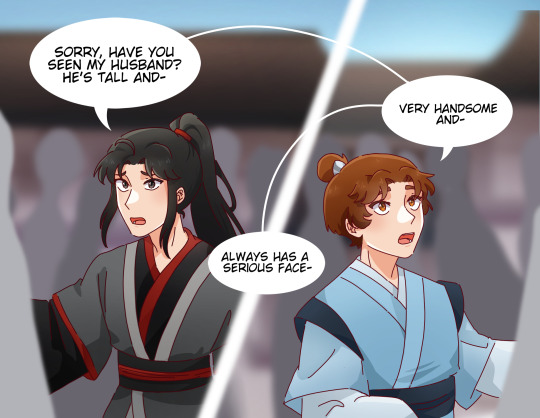
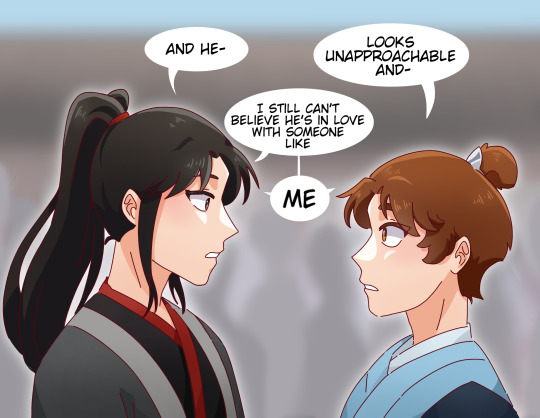
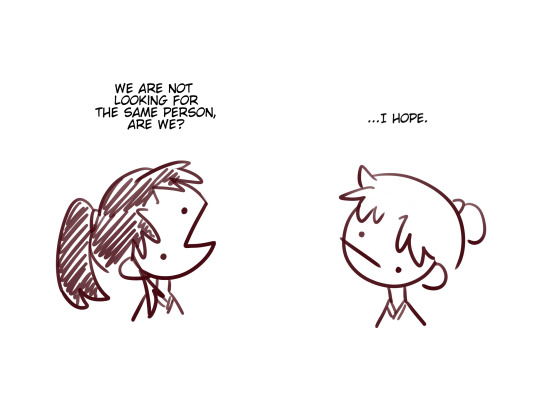
bonus - the ending y'all expected

#The true perfect crossover#Mxtx has a favorite dynamic and I will stand by it#I also believe SQH and WWX would get along soooo well
3K notes
·
View notes
Text
I was thinking about how strange it was that I started journaling when I felt better psychologically, because then what I wrote about would be uninteresting right?
Then I remembered I am writing for myself when I'm journaling, so there's no "audiences" except myself, and that's exactly why I started journaling in the first place. Because I stopped seeing my therapist about a year ago and needed a new way to regulate my emotions.
Just that realization that I got nothing to prove to others, that I don't always have to create for others... I've really grown as a person haven't I?
#a friend once told me I could put some of the scrapbooks I made in my journal in my portfolio#and I sincerely replied that I did those for myself and had no intentions on making profit from them#it's my hobby and that's enough <3
2 notes
·
View notes
Text
aita for recommending svsss to my straight guy friend??
okay so we were talking abt fav books and I started talking abt svsss and then he asked to borrow it and he has no idea what danmei or BL is...do I tell him?? Also he's reading it and thinking so much in terms of sqq "beating" lbh and how he's going to do it and I am soooo tempted to say the power of love
I'll liveblog his reactions if they're entertaining enough but I have a feeling he's going to F L I P when he gets to the kiss
914 notes
·
View notes
Text

#It's true and I'm so glad it is actually#The way the svsss fandom ends up being so unrestrained thanks to airplane-bro is everything I could ask for#It's thanks to him that people can make amazing stories or stupid smut without shame#It's thanks to him that I can find the most unhinged content on Ao3 now#Airplane my favorite plot device <3
6K notes
·
View notes
Text
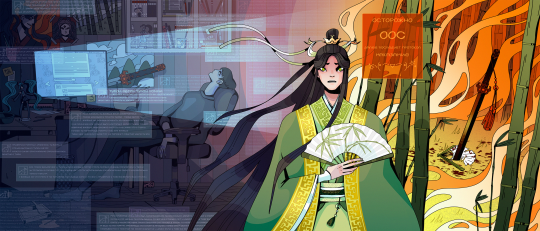
check the expiration date of the food in your refrigerator (´。• ω •。`)
916 notes
·
View notes
Text
Does anyone want to listen to me gush about junk journaling? I kind of want to gush about junk journaling and how much I love it.
4 notes
·
View notes
Photo

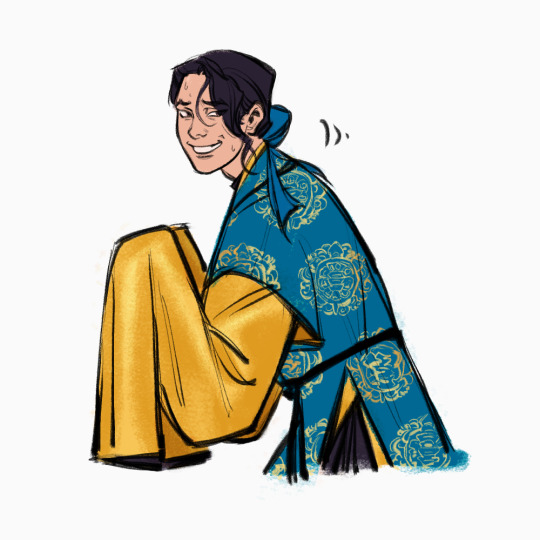
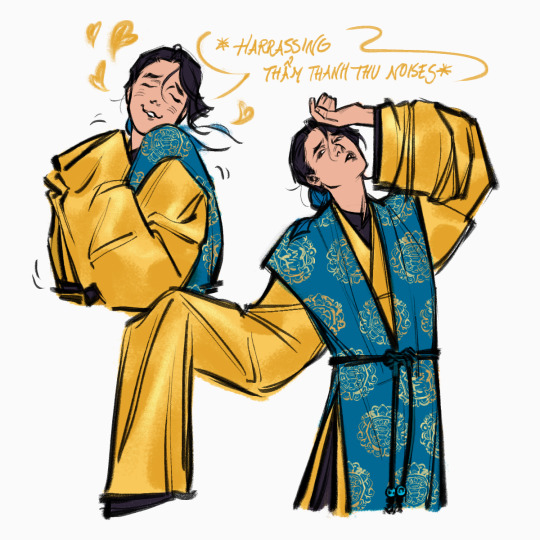
vietnamized shang qinghuas from twt. or txt. whatever the hell ppl b calling it these days. anyway
thượng thanh hoa my bastard bitch boyfriend who did everything wrong
#I absolutely love how you drew him#The super long sleeves? Genius#His drama queen attitude? Perfect#The sleaziness in his expressions? Incredible#I adore your art style all in brush strokes and very dynamic#Incredible thank you so much for sharing it with the world
1K notes
·
View notes
Text
Now I have a Mermaid Moshang Au going around in my head.
So, let's say, Airplane still wrote a book, but it was about mermaids, and the main protagonist, Luo Binghe was half merman, half human. With the exception that mermaids are the obvious good guys, so the sects and cultivarors are the mermaids, and the demons are humans, with demon lords being researchers.
Rest is under the cut, because what I wrote could be a fic on its own.
Airplane dies and becomes a merman Qinghua. He saves young teenage Mobei Jun, Little Mermaid style, and falls in love instantly. However, he knows they cannot be around each other, so he leaves Mobei safe on shore.
Years later, Mobei becomes a scientist researching oceanic life, all in search for a merman he is not sure is even real. Maybe he has only dreamt about him.
Since he is so accomplished and clearly inclined to believe in the existence of aquatic mythological creatures, he gets a job in secret research facility where they already research real life mermaid.
And this is where my angst love popped in.
Mermaids cannot speak human language. They communicate in chirps and screeches like dolphins. Their teeth are sharp, their eyes alien. They are treated at best as objects, at worst as potential threat that needs to be researched, studied, cut open to see how it works and how best to kill it.
Mobei cannot let others know he has sympathy for these creatures or else he would be banned from research. He finds a kindred spirit in one of the research leads, Shen Qinqiu, who appears to be the most ruthless person he ever met but is surprisingly gentle with the creatures they handle, and proposes that maybe, just maybe they are not malicious at all. No more than people, at least.
[I needed Cucumber to be human for this one, for better BingQiu purposed. In the original novel that Airplane wrote, Shen Qingqiu was the most heartless of the scientists, doing research on a captured, teenage protagonist. His abuse caused the young merman's ancient powers to awaken. He learned how to control water Aquaman-style, how to speak the human language and thanks to his ancient magic - his father was half water-dragon - how to change shape to appear human. But that is all irrelevant, because Shen Yuan does not want to capture and operate on Binghe at all.]
However, as it happens, the plot must make its appearance.
Shang Qinghua was careful. Was very, very careful, He never had OOC function to unlock because he has always been Shang Qinhua. So he thought, he can avoid original Shang Qinghua's fate which was being captured by humans, implanted with a tracking, which led the humans to his colony, and to Binghe. He as so careful! But the system tricked him, and Qinghua gets captured anyway.
He is panicking. This is the worst! He will be experimented on, forced to out his kin, or, if he is lucky enough, just killed. What sort of world he wrote?! What sort of fate he created for himself!
He deserves it, of course. He wrote mermaids to be peaceful, hunted, tortured and killed. Of course, he deserves it for condemning an entire race. At least, he gets to see his favourite creation one last time. Because, Mobei Jun is here.
In the original story, Mobei blamed mermaids for the sinking of the ship, from which Qinghua saved him in this storyline. He did not become a researcher but a whale hunter with a penchant for mermaids. Only meeting Luo Binghe changed him, and he became the fiercest fighter for mermaid cause afterwards.
Qinghua is sure Mobei is there for revenge. Mobei recognizes Qinghua but he needs to keep up appearances. However, Shen Qingqiu recognizes the character of Shang Qinghua as well. He knows how the story goes. Qinghua is 'researched' and then let go with a tracked. He cannot let that happen but the other scientist would be suspicious if he was kind to a merman. Instead he proposed to kill him, and research the body - in his mind, it would be a mercy killing, after all.
Mobei keeps his cool, but underneath, he is boiling with rage. On one hand, he sees the kindness in Shen QingQiu's decision. He sees the mermaids in their tanks every day. How sick they are, how empty and unhappy. It would be a mercy killing. On the other, that us the marman that saved him all these years ago. In a small tank, terrified and crying, and shaking, and begging them with his eyes only to please, please, don't hurt him. Just let him go, please.
Mobei suggests waiting with the decision to the next day. Clearly, they caught only a runt, a shrimp. it is weak and won't do much for research but maybe it is more valuable alive. They should consider their options. In reality, he plans to free Qinghua over night, when nobody is watching.
He is not the only one with the same idea. Cucumber gets to Qinghua first. Under the assumption that mermaid cannot understand human language - they could not in the book - he breaks Qinghua out cursing all the while - at stupid plots, at stupid authors and at pointless characters who turn out to be so much bother!
Except, Qinghua understands him. Of course he does! He is the author. He gets Cucumber's attentions, drawing characters with water on his coat. Cucumber at first thinks nothing of it, until he notices the pattern. It is the title of the novel!
Cucumber immediately understands that Qinghua is a transmigrator, just like himself! He gets him paper and pen and they communicate.
And then Mobei Jun steps in. Qinghua and Qingqiu are caught red handed. Qinghua is panicked at his sight. In a desperate attempt to save himself, he grabs the pen and Cucumber, and holds him as a hostage, pressing the pointy end of the pen to the other's neck.
It would be terrifying if it weren't so sad. Qinghua cannot hold himself up out of the water very well. He is shaking from fear and his hold is lose - if Qingqiu wanted to break out, he could with no problem. It is clear that Qingqiu is shielding the merman.
There isn't much that Mobei can do except lift his hands in a peaceful manner and promise:
"I want to help. Please, let me."
TBC? Maybe?
123 notes
·
View notes
Photo
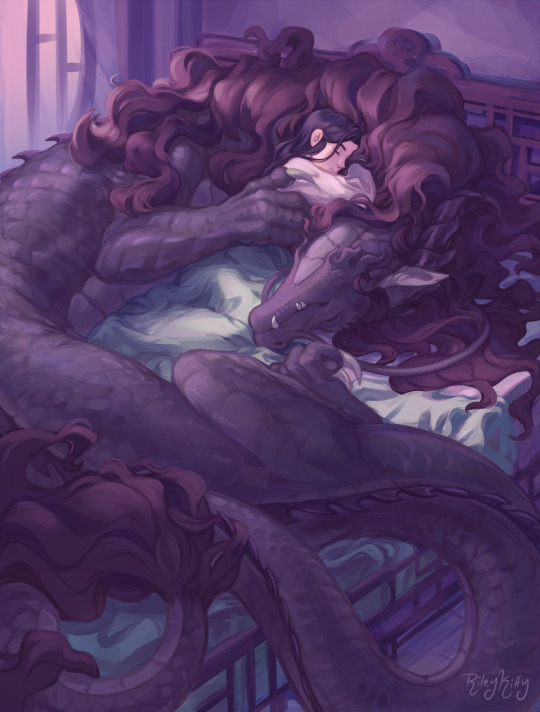
Shizun, would you still love me if I was a wyrm?
(Yes. Absolutely. Are you kidding?? So cool!!!)
My piece for the Bingqiu Reverse Minibang, featuring a dragon transformation for Binghe! <3
#Nnngh I love this piece so much#The softness of their embrace#The way LBH dragon's body curls around SQQ so perfectly (very satisfying btw)#The way you rendered the hair and sheets#And without forgetting the soft light!#This is definitely one of my favorite illustrations ever#I so want to scratch LBH's dragon chin#He curls up like my cat 🥺#Fantastic art thank you for blessing us with it! ❤️
12K notes
·
View notes


